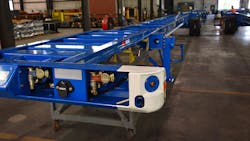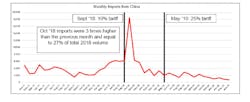Trade commission finds cause in intermodal chassis dispute
[Editor's Note: A version of this story originally appeared in the September print edition of Trailer/Body BUILDERS. It has been updated to include information from the recently posted preliminary public version of the ITC Staff Report.]
The United States International Trade Commission has determined there is “a reasonable indication” US trailer manufacturers are “materially injured” by the import of container chassis that are allegedly subsidized by the government of China and sold in the US at “less than fair value.”
The commission voted unanimously on Sept. 11 to proceed with the final stage of the investigation of CIMC Vehicles (Group) Co. Ltd., whose subsidiaries make it the world’s largest container chassis builder, in response to a petition by the Coalition of American Chassis Manufacturers.
“The Coalition is gratified by the Commission’s 5-0 affirmative preliminary determination,” said Robert E. DeFrancesco III, partner in Wiley’s International Trade Practice and counsel to the petitioners. “This was a critical step in the process to get the US industry the much needed relief from unfairly traded imports that it deserves.”
The coalition filed petitions July 30 charging that imports of chassis from China are materially injuring the American container chassis industry. The petitions and subsequent testimony attempted to show that the state-supported Chinese industry is selling container chassis in the US at less than fair value, distorting the domestic market and resulting in the loss of significant manufacturing jobs.
The petitioning companies include the five members of the Coalition of American Chassis Manufacturers: Cheetah Chassis Corp., Hercules Enterprises LLC, Pitts Enterprises Inc., Pratt Industries Inc. and Stoughton Trailers LLC.
The coalition detailed for the commission how from 2017 to 2018—in an effort to beat the imposition of Section 301 duties—Chinese-government owned CIMC rushed a massive additional amount of chassis into the US. This “spike” was a “shock” to the market, as CIMC imported at least two years’ worth of chassis in 2018 alone, according to the post-conference report. The surge caused a huge build-up in inventories, which continue to “overhang the market to this day.”
Essentially, that huge inventory meant customers could expect quick delivery of even large orders for industry standard chassis from CIMC, while US companies would need to ramp up production.
But, as representatives from each coalition company explained, the capacity to meet demand was available. Bob Wahlin, president and CEO of Stoughton Trailers, testified that Stoughton has “proven that from just one shift we can get a little over 5,000 units per shift,” and “could produce 10,000 units per year and could even get to 15,000 units.”
Additionally, the coalition argued, chassis are sold on the basis of price, and price—not any lack of available domestic capacity—explains the huge volumes of Chinese imports that entered the US market during the period of investigation (POI). “The only way for Chinese producers to bring this surge of chassis volume into the US market was to drastically undersell US producers,” the filing states.
Indeed, Frank Katz, chairman of Cheetah Chassis, testified that in response to a large trucking company’s suggestion that his company could not build to the carrier’s specifications, Cheetah offered to build the chassis for $1 to showcase its abilities. Cheetah built the chassis, which the trucking line used. When Katz followed up with the trucking company for a quote, the customer indicated that it was satisfied with the Cheetah chassis, but Cheetah was simply not competitive with subject import prices.
Added Stoughton’s Wahlin: “Even when we tried to fight and obtain orders, there was no bottom to their price. CIMC would continue to lower their prices until we suffered. We could not get raw materials into our factories as cheap as their landed fully assembled chassis into US ports—we didn’t stand a chance.”
Pratt President Kent Musick concurred. “Chinese imports of chassis were being offered at prices below cost of our raw materials.”
Chinese government subsidies include loans with preferential rates, grants to promote exports, provision of inputs for less than adequate remuneration, and preferential income tax treatment. These subsidies allow CIMC to sustain its unfairly traded prices and to undersell US producers, the filing states.
Too little, too late
In its defense, CIMC argued that the US companies had only themselves to blame for not responding to “significant regulatory and market shifts” well before the POI and tariffs.
Notably, beginning in 2009, the shipping lines abandoned their trucking operations, opening the market to for-hire carriers. This coincided with the introduction of a more rigorous motor carrier safety accountability program from the US DOT.
“This sparked a decade-long transformation in the structure of the chassis market, as three new categories of purchasers replaced the ocean carriers: (1) leasing companies; (2) major trucking lines (and railroad carriers); and (3) dealers,” CIMC states. “The combination of the tighter safety requirements and liability obligations generated demand for newer, safer chassis to replace aging fleets, as well as new designs to make trucking companies more efficient (now that chassis more directly impacted their bottom line).”
And while CIMC invested in new designs, processes and automation, US manufacturers did not.
On behalf of CIMC, Gregg Carpene of TRAC Intermodal testified that, over the past 17 years, he could not “recall a single time when the US industry made substantial improvements. … They have never, to my knowledge, made the kind of capital improvements and expenditures needed to substantially improve their production capacity.”
As a result, in addition to availability, customers repeatedly cited CIMC’s superior quality, extended warranty coverage, and customer service as additional reasons they prefer the CIMC chassis, according to responses to the commission’s Lost Sales/Lost Revenue Survey.
The recorded evidence fails to provide reasonable indication that the domestic industry was materially injured by reason of the chassis imports, CIMC contends. With respect to volume, CIMC imports did not significantly displace US producers’ shipments from the chassis market; rather, those imports satisfied US demand that the smaller US producers could not. Regarding price, purchasers turned to CIMC because of nonprice factors.
“Chinese chassis imported and sold during the POI cannot fairly be blamed for the reluctance of ‘small, privately held companies’ to expand their production capabilities before the POI,” the response reads.
Those claims that Chinese chassis have superior quality, paint systems or warranties are simply “red herrings,” countered the coalition. As Hercules COO Frank Conti explained, “Not once has a customer stated to me that Chinese chassis or a Chinese producer’s warranty is in some way better than ours. I believe the only differentiation is chassis price.”
The Truck Trailer Manufacturers Association filed a statement in support of the coalition, echoing claims of excess imports and price cutting.
“TTMA is sympathetic to the concerns of other industry players, including trucking companies,” TTMA said. “However, dumped and subsidized imports cannot be used to boost the profits of downstream companies in the industry, particularly when it threatens to put the domestic chassis manufacturing industry out of business. And it does.”
The entire investigative process will take approximately one year, with final determinations of dumping, subsidization, and injury likely occurring in mid-2021. However, duties can attach to imports of the subject chassis as of the time of the preliminary determinations by the Department of Commerce.
Countervailing duties are intended to offset unfair subsidies that are provided by foreign governments and benefit the production of a particular good.
Financial details supporting the petition—such as market share, sales and revenue projections—are not made public.
Preliminary report
The commission’s 188-page preliminary staff report details the criteria required to make the determination, including detailed analysis of the product that is the subject of the investigation as well as the nature of the domestic industry that is alleging harm.
The commission agreed with the US manufacturers that, in terms of the investigation, there should be no distinction between chassis subassemblies and fully assembled chassis.
“Every responding U.S. producer and importer indicated that the process to transform subassemblies into fully assembled chassis is not significant or particularly labor or capital intensive,” the report states. Similarly, “there are no uses for chassis subassemblies other than for the production of the finished chassis” and “there is no market for chassis subassemblies distinct from the market for fully assembled chassis.”
And while the values are redacted in the public version, the report details that “there is not a significant difference in the cost or value between the group of subassemblies that comprise a full chassis and fully assembled chassis.”
In turn, the commission agreed with the petitioners that US-based CIE Manufacturing, the rebranded CIMC subsidiary previously called CIMC Intermodal Equipment, does not perform “sufficient production‐related activities” in the US to be included in the domestic industry.
“CIE’s assembly operations encompassed a modest capital investment, particularly compared with production of completed chassis, and are not technically complex,” the report says. “The record, although incomplete, indicates that these operations neither add substantial value to the product nor employ substantial workers. Moreover, CIE inputs many of the components it assembles from its affiliates in China.”
The commission then must determine whether there is a “reasonable indication” that an industry in the US is materially injured or threatened with material injury because of the imports under investigation.
Again, the numbers are redacted in the analysis of chassis market—such as demand level, volume of imports, and pricing—during the POI. Still, the commission found that the volume of subject imports is “significant” in absolute terms and relative to U.S. consumption and production and that subject imports “significantly undersold” the domestic like product and gained “appreciable sales” at the expense of the domestic industry.
And while CIMC argued that the domestic industry is unable or unwilling to satisfy US purchasers’ demand for high volume orders of standard chassis on flexible delivery schedules, the argument does not explain the appreciable amount of sales that the domestic industry lost due to purchasers that expressly indicated they purchased subject imports “due to lower prices,” the report concludes.
The formal report will be available after Oct. 13, according to the ITC. When available, it may be accessed on the USITC website at: https://www.usitc.gov/commission_publications_library.
About the Author
Kevin Jones
Editor
Kevin has served as editor-in-chief of Trailer/Body Builders magazine since 2017—just the third editor in the magazine’s 60 years. He is also editorial director for Endeavor Business Media’s Commercial Vehicle group, which includes FleetOwner, Bulk Transporter, Refrigerated Transporter, American Trucker, and Fleet Maintenance magazines and websites.
Working from Beaufort, S.C., Kevin has covered trucking and manufacturing for nearly 20 years. His writing and commentary about the trucking industry and, previously, business and government, has been recognized with numerous state, regional, and national journalism awards.


